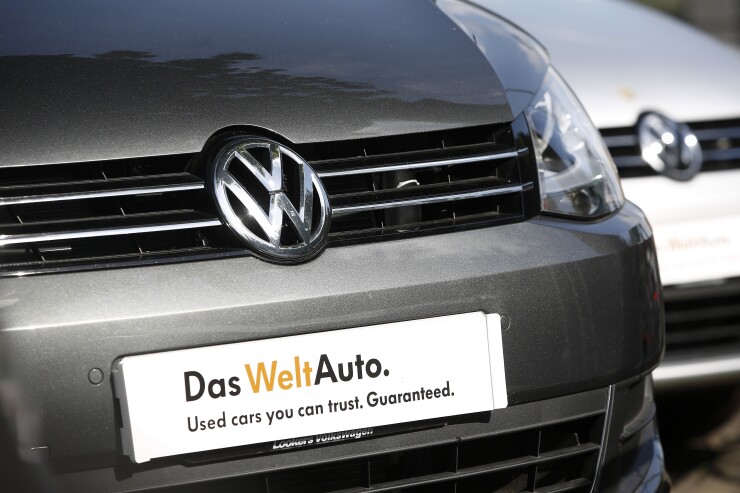Volkswagen was compelled to shift its funding strategy last year in the wake of an emissions cheating scandal. It stepped up issuance of asset-backeds, which were less impacted by the fallout than the company’s stocks and unsecured debt.
Now that investor confidence has been restored, Volkswagen is returning to its traditional funding pattern. In June, it issued €3.5 billion of hybrid unsecured bonds for the first time in 18 months. “The highly successful placement is evidence of our good standing on the capital market, despite a longer pause in our issuance,” Frank Fiedler, CFO of Volkswagen Financial Services, said in a statement issued when the transaction closed.
Volkswagen has no plans to pull back from the securitization market, however.
“The refinancing of Volkswagen Financial Services is carried out on the basis of strategic diversification,” spokesman Marc Siedler said in an email. “In addition to Auto ABS transactions, deposits from the stable direct banking business and the money and capital markets are the most important elements in the refinancing mix.”

Sielder said that during the fiscal year ended March 31, 2016, bonds backed by auto loans and leases accounted for 19% of Volkswagen’s funding mix. This figure includes both dollar-denominated bonds backed by U.S. vehicle financing and euro-denominated bonds backed by European vehicle financing. That was up four percentage points from 15% for the fiscal year ended March 31, 2015.
Volkswagen was able to continue accessing the securitization market at low cost because consumers continued to make timely payments on their loans and leases. The manufacturer recalled thousands of diesel vehicles to bring them up to regulation. In a June 28 report, Moody’s noted that the delinquency rate of VW deals it rates has remained “consistently low” in Germany, Spain, France and the U.K.
Moreover, VW Group diesel vehicles have retained their relative value against other manufacturer diesel vehicles, despite the fallout from the emissions crisis. So even when consumers stopped making payments, and the vehicles were repossessed, they fetched a good price at auction. (Consumer repayment behavior is generally supported by stronger used values, as the borrower can sell the vehicle to cover the debt without falling into arrears if they are under financial stress, per Moody's.)
While the cost of funding unsecured debt has now fallen, “it is the security of the funding that counts for us and not the last spread point,” Siedler said. “Volkswagen Financial Services are a frequent ABS issuer; we do not plan change our frequent issuance pattern.”
However, Moody’s is concerned that values for used diesel cars of all brands could come under pressure as local governments across Europe take actions that make it less attractive to own and operate cars with engines that emit high levels of nitrogen oxide.
“We think that, over time, regulatory actions will lead to a broad based negative pressure in the value of diesel vehicles, as consumers respond to increasing costs of owning a diesel vehicle,” the rating agency stated in the report. It noted that in cities like Madrid, Milan, Paris and Stuttgart, authorities have threatened to ban diesel cars. And the U.K. government has recently proposed a clean air zone framework, which includes a minimum emissions standard that would charge diesel vehicles that do not meet Euro 6 standards of emissions, versus Euro 4 standards for vehicles that run on gasoline.
These moves did not have a measurable impact on sales of diesel cars in 2016, but Moody’s expects to see a larger decline in the proportion new diesel vehicles sold in 2017. And it expects this shift in consumer demand will be echoed in the used car market.
“Scrappage schemes may be implemented in various markets to remove older diesel vehicles from the road, but any such schemes are unlikely to fully mitigate negative pressures on diesel used car values caused by stricter regulation,” the report states.
Anthony Parry, a senior vice president/manager at Moody's, said VW has a strong track record in the ABS market, having come to market regularly since 2000. "We’d expect them to continue to tap their well-established ABS investor base as part of a diverse funding mix,” he said in an emailed statement.





